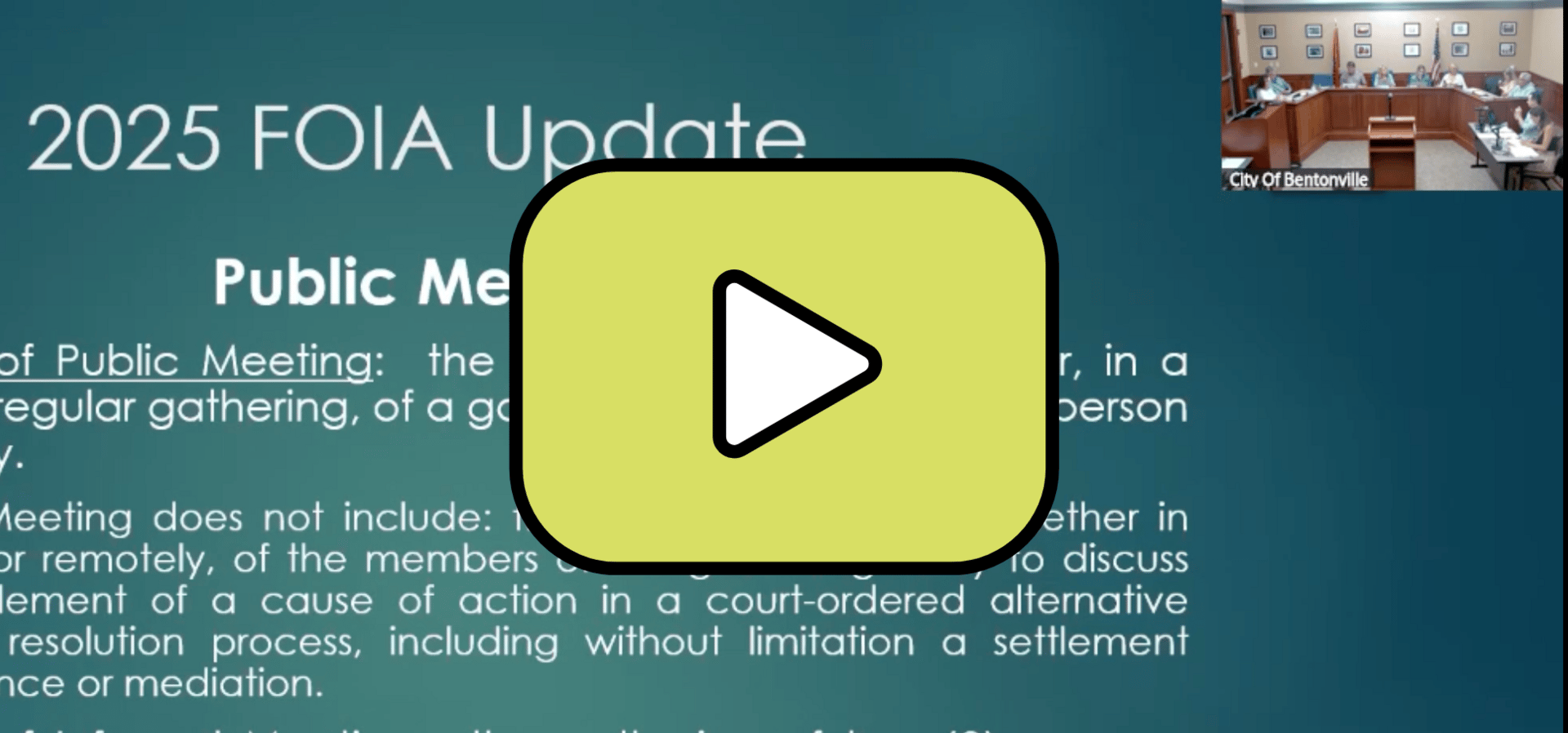New guidance from the City of Bentonville’s legal counsel recommends that City Council members record all conversations with city staff and each other that occur outside of public meetings.
According to a presentation at the City Council meeting on Tuesday, July 22, the guidance is a result of changes to the Freedom of Information Act passed at the state level. The law sets rules for how the city’s business should be conducted, and the changes strongly encourage deliberation and decision-making to take place in public meetings.
City Council member Bill Burckart reacted strongly to the recommendation.
I feel it's a violation of my rights by taking this step. It’s not required by law. It’s a violation of my right to be able to have conversations with staff to get factual information. … I need to be face-to-face and have these conversations, and as a legislative body, I have the right to do this without interference.
City Attorney Nick Henry said the recommendation was based on the law, but confirmed the law itself does not require City Council members to record their conversations.
“Most businesses have legal policies in place that go above and beyond the law to ensure they —” he began to explain, before being cut off by Burckart, who said he is an elected official — not an employee of a business.
After the meeting, Burckart sent an email to members of the press stating that he would introduce an official resolution to overturn the guidance. If that is unsuccessful, he said he would pursue “a request for judicial intervention” to block it.
Since City Council members are elected officials, the city’s legal team cannot force them to follow its guidance. However, city employees could be required to record the conversations.
Reasoning Behind New Recording Recommendation

There is what the law says and what the law means — the latter of which is usually clarified by official opinions from the Attorney General and subsequent case law (basically, other government entities being sued).
Lawyers working for the city have no official guidance on interpreting the recent changes to the law, meaning they have to make their own conclusions for now.
“There’s still not 100% clarity around what this law is going to look like at this point in time. Hopefully, we begin to get more clarity as this goes into effect,” Henry said.
Legal staff said they hope to receive additional guidance on several aspects of the law and may change their recommendations in the future.
Compared to previous versions of the Freedom of Information Act, there is more at risk now: judges can overturn any decision made by the City Council if a violation of the law is found to have occurred.
If someone alleges a violation occurred, recordings of conversations would allow the city to easily quash those allegations in court.
“If it becomes a he said, she said thing from a meeting, having the recording or the email should protect all of us, is what we’re trying to get to with this, because of the consequences,” Mayor Stephanie Orman said.
Under previous versions of the law, it was a violation for City Council members to discuss matters up for a vote with each other outside of public meetings.
Now, some conversations between council members and city staff could also amount to a violation.
Outside of a public meeting, city employees are now restricted from communicating with City Council members about how they plan to vote or their position on an upcoming agenda item.
Bonnie Bridges, an attorney for the city, said that rather than trying to influence City Council decisions, city staff would focus on providing “background and nondecisional information,” which is permitted under the law.
“Part of what we have to do — and what we’ll be training the staff — is that we are just giving you factual information. And we’re not just giving you our opinion, or we’re not trying to get you to do one thing or another, because it might be easier for us or we might like it better. That we are just giving you facts, the background, how things happened, why they happened — and not what you should do about it,” Bridges said.
Other Reactions
Burckart said multiple times that he would not record conversations he has outside of public meetings.
“I won’t do business if I have to record people to do business. I’m not going to record everybody’s conversation. I’m from an old school, that’s not who I am. I’m not going to record what I talk to each of you about. It’s not necessary,” Burckart said.
While council member Cindy Acree also expressed concerns, other members seemed more open to the idea of recording their conversations:
“I think it's a good idea.”
“I don’t feel legal is trying to make this more onerous on us. It is onerous. We have to deal with that. I feel like we’re getting a little bit petty, because I think there’s a very easy way we can handle this. You can have your phone out there to record. You can keep it on your own phone if you want. It feels like, for the initial stages here, we want to make sure we’re getting it right so we don’t get sued.”
“This is the interpretation that our legal team has on this aspect. The consequences of not doing it, as it is interpreted today by the legal counsel of this city, are that we either do it this way or we face the invalidation of decisions we take on any item. … Sometime later, we’ll get clarification on this, and the process will change. For the time being, let’s go for it.”

